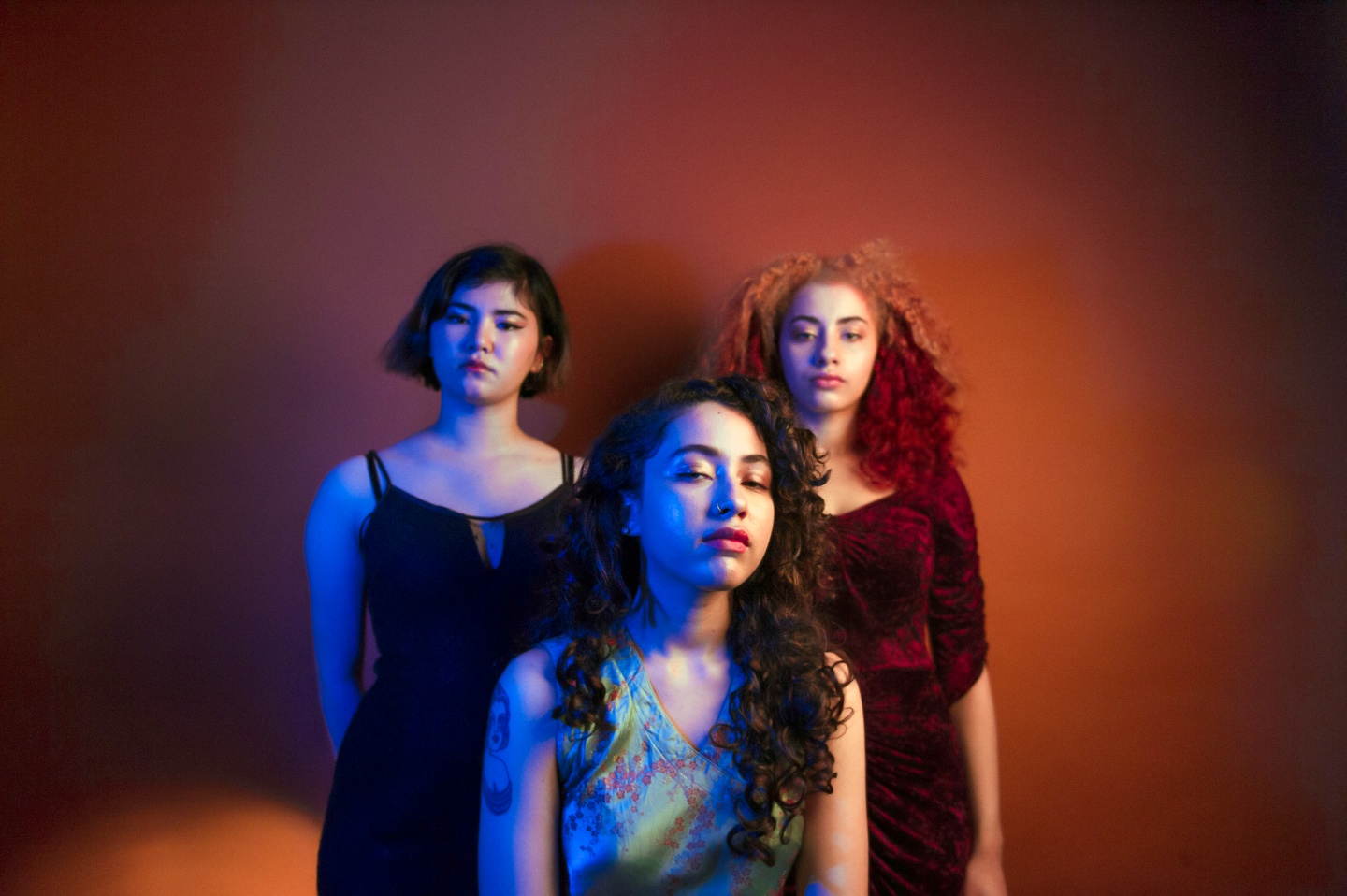Skinny Girl Diet Make Raw Music For Disenfranchised Girls Everywhere
The songs of these three women under 21 will grab you by the throat and force you to look at the world around you.

Skinny Girl Diet are dressing for war. “The concept is warrior queens,” the punk band’s youngest member Ursula Holliday says while fingering a glittering ornamental crown in an east London photo studio. On The FADER’s shoot, she’s surrounded by the fruits of the three-piece group's costume sourcing trip to a local vintage store the previous day. A nearby sofa is strewn with their spoils: gigantic shell necklaces, medieval chain chokers, and pieces that drip with winking paste rubies. “Amazons; Boudicca,” Ursula explains of today’s inspirations. “Women you don’t fuck with.”
Nearby, her elder sister and band front woman Delilah Holliday is shimmying into a delicately patterned traditional Chinese cheongsam, while Amelia Cutler, their cousin and third member of the group, steps into the room adjusting the straps of an elegant black dress. “99p off eBay,” she beams. “We’re really good at bargains.”
Breaking boundaries on a budget is a trait that’s come to characterize Skinny Girl Diet, a formidably intelligent north London group that operate under a strict DIY ethos. Everything is done in-house, from the production of their insistent, scrappy rock tunes that have brought them to the attention of The Slits’s punk luminary Viv Albertine, to the slyly original zines they create to further distribute their feminist politics (a recent one included a xeroxed guide titled "How To Spot A Fuckboy").
 Zine scans courtesy of Skinny Girl Diet
Zine scans courtesy of Skinny Girl Diet

They’re battle hardened, too. Although the oldest member of the band is only 21, Skinny Girl Diet has existed in various guises since their early teens. "Ursula and me started the band when we were kids," Delilah recounts. "It was called Typical Girls. Then, we felt like we needed to take it more seriously." After discovering their cousin Amelia was learning bass, they asked her to join too.
Their self-contained, refreshingly organic nature has enabled Skinny Girl Diet to become headlining names on London’s DIY scene, without sacrificing the assertive individuality that blasts through on tracks like 2014’s “Nadine Hurley.” The song was named in honor of the eyepatch-wearing Twin Peaks character. “No one takes her seriously but she’s a strong, powerful woman,” Delilah explains. “I thought if there was a way for me to get people thinking about her, it would be amazing”
A stream of endless shows and two arresting EP releases mean that Skinny Girl Diet’s profile has rocketed in the past three years. In this time, they’ve collaborated with London fashion designer Claire Barrow, they currently host a monthly NTS radio show, and played a divisive Boiler Room set last year (“It was like playing to zombies—[Boiler Room] had to disable the comments on YouTube because people hated it so much”). Yet despite a steadily growing pile of offers from record labels, Skinny Girl Diet remain resolutely independent, refusing to be distracted by the shiny feathers and fur of the record industry. They can get these on their own—and at a cut price to boot.
Your band name is pretty striking. Where did you get it from?
DELILAH: I was scrolling through Tumblr one day and there was a tag called #skinnygirldiet. It was pictures of girls with their ribcages showing—it was sickening. So the name is a sort of social commentary on that. The beauty ideal is skinny, but skinny girls still feel the pressure to diet.
URSULA: Five in ten girls have apparently thought about plastic surgery. Being a part of this band has really opened my eyes; it’s helped me grow, it’s helped me love myself. Imagine if everyone loved themselves. The ‘big money men’ would not be making money.
You did a cover of Dusty Springfield’s “Spooky” for Claire Barrow. How did that come about?
URSULA: She was the first person in fashion to reach out to us and really like what we were doing. Delilah’s always loved her.
DELILAH: She hit us up and we recorded “Spooky” on a boat. At the moment though, we’re trying to focus on the music. We don’t want to be seen as a fashion band at all.
URSULA: Male bands don’t have to deal with that problem. As women, if you’re not focused on your image this industry doesn’t take you seriously. With a punk-type band, you can’t be too glamorous otherwise punks don’t get it, they’re like, “Why are they dressing up?” And when you do roll up, just woken up, with ripped jeans on, people say, “They don’t try, they’re dirty.” You can’t win.
AMELIA: We once got a Guardian review that focused entirely on our outfits. They said I was in “a regulation Riot Grrrl pinafore dress.” I was wearing a turtleneck and a skirt because I’d come straight from uni.
URSULA: I hate labels. We want to completely defy everything. If we’re unique and no one can really pinpoint it, good. As soon as you’re labeled, it’s limiting. That’s why I don’t really want to be called 'Riot Grrrl' or 'punk.' Riot Grrrl was accused of not including people of color—if you did your research, you’d know we wouldn’t be a part of Riot Grrrl at that time.
DELILAH: We have a punk attitude, we were brought up on a DIY ethos—but on the other hand we’re not typically punk. We don’t play three chord songs, really fast drum beats, and scream. We play from our emotions rather than conforming to a musical genre.

“I don’t really want to be called 'Riot Grrrl' or 'punk.' Riot Grrrl was accused of not including people of color—if you did your research, you’d know we wouldn’t be a part of Riot Grrrl at that time.” —Ursula Holliday
How does this labeling affect your audiences?
DELILAH: We either get girls like us or older audiences who went to original punk shows. Which is quite a big compliment. We met these girls who came to our show at DIY Space for London a few months ago and we kept in contact. They just told me, “We’re gonna start a band, you’ve inspired us,” and they’ve actually been rehearsing. I felt so proud that we could have that effect on someone.
More and more artists are talking about the difficulties of being DIY in London right now. How do you manage it?
URSULA: Well, we’re doing the band full time now and it is really hard. But it’s so jokes—we’re playing gigs with people who’ve spent so much money. Their record labels are pushing them, they’ve got about ten grand behind them, and they’re pretending to be a breakthrough artist. Our dad is our manager. He reads all of our emails and has to help us out with everything. Staying grounded is all you can do because the industry will swallow you up otherwise, and you’ll be in masses of debt to a label that doesn’t understand you and puts you on the shelf. To be honest, it’s going pretty well being independent.
AMELIA: We’re not just going to jump on any record label.
DELILAH: The more people from the underground that come through, the less the labels can manipulate the music industry.
You’re women of color playing alternative music. How does the music industry react to that?
URSULA: In shoots, they’re often like, “Can we dress her up like Beyoncé?” The pure audacity to look at the colour of my skin and my curly hair and say, “Hey, she should be playing hip-hop or R&B because she’s mixed race.”
DELILAH: And if it’s bad for us, what was it like for artists like [X-Ray Spex vocalist] Poly Styrene back in the day? Last year, we had the worst shoot with some people we had worked with before, which made it even more unexpected.
AMELIA: It was awful. The stylist called me "a little Oriental girl." You always say you’ll stand up for yourself in these situations, but when you’re actually there it’s much more difficult.
URSULA: I was 17 at the time and they made us wear latex lingerie, pose on motorcycles with our legs spread in a cold studio with no food. We were shivering and no one spoke to us. Men were whipping out their phones and taking pictures of us. Then this old, apparently ‘legendary’ photographer from the '60s started taking pictures of Delilah’s crotch. When we complained, the publication said that we’d never work again and they’d spread it round that we were ‘challenging.’


“We want to make music for girls to feel powerful and liberated. Fair enough to people writing songs about heartbreak, but when I’m sad I want to listen to music that’s about more than just love affairs.” —Delilah Holliday
Skinny Girl Diet is inherently political. Do you think young people are more politically engaged now?
URSULA: You’ve got people on Instagram, writing ‘feminism’ on [underwear] and spouting on about being activists. What are you actually doing? Come to the marches! Create a band where you get shit for actually living your feminism. Go find a like-minded person to share your views with and have a discussion and a debate. Physical things are so important in this internet driven age, and doing things makes you feel like you’ve achieved so much more.
Do you think education is a factor in political disengagement?
AMELIA: Obviously education is really important, but it’s also where the dominant view is enforced. We have a very white curriculum [in Britain].
URSULA: Once I got sent out of class for saying, “Margaret Thatcher is not a role model.” I think it’s very hard to express yourself when you’re taught to comply all the time. I’m dyslexic so it was particularly difficult—the format they taught in didn’t translate to me, but they didn’t get that. And [the U.K. government] aren't putting money in arts; imagine if they were to help people start bands. At school, I was under so much pressure, I was almost suicidal. I had thoughts like, ‘I can’t do this anymore.’ And when I wanted to go to theater school, I couldn’t because they wouldn’t give me a loan and it would cost nine grand.
AMELIA: And we don’t get taught the practical stuff. I don’t know anything about taxes! They don’t prepare you for actual life.
DELILAH: This is why we’re so angry. We want to make music for girls to feel powerful and liberated. Fair enough to people writing songs about heartbreak, but when I’m sad I want to listen to music that’s about more than just love affairs. We want to make music for girls like us.
Headpieces courtesy of Pebble London; Hair and make up by Terri Capon.
